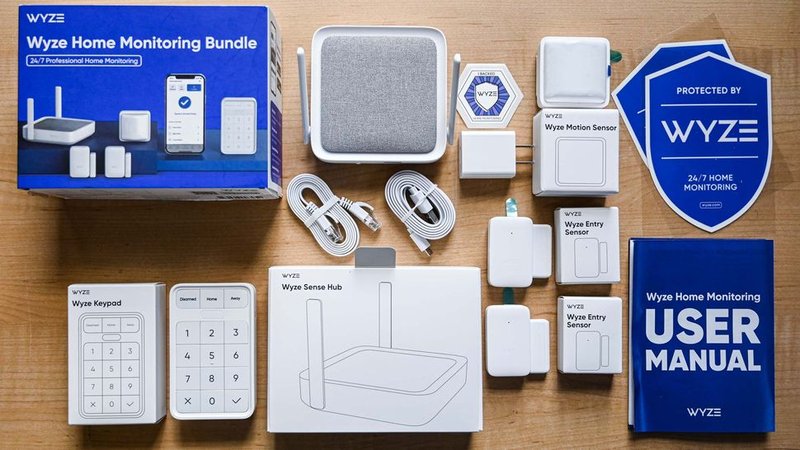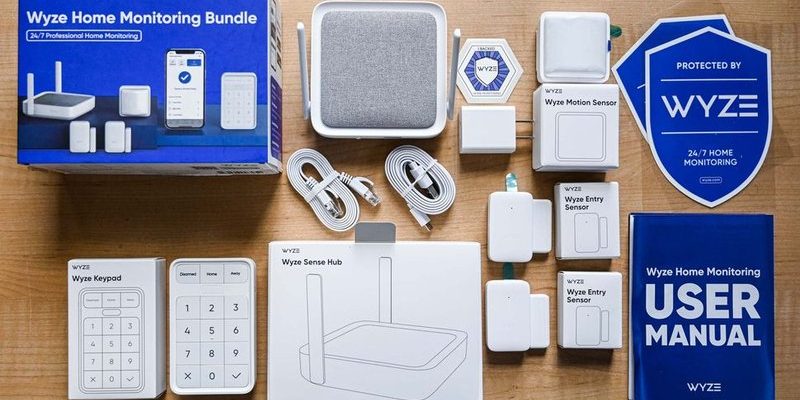
Wyze is known for affordable, DIY-friendly smart home security—from cameras and sensors to full kits you can sync up in minutes. But unlike buying a throwaway TV remote, this stuff is supposed to give you peace of mind. When the extended warranty offer pops up, it’s totally normal to wonder: “Am I just paying extra for nothing, or is this a smart move for protecting my investment?” Let’s dig in and figure out if extended warranty coverage really makes sense for your Wyze security gear, or if you’re better off just crossing your fingers and keeping those receipts.
What Does Wyze’s Extended Warranty Actually Cover?
Let’s start at the beginning—what are you *really* getting when you decide to buy an extended warranty for your Wyze security system? It’s easy to assume “warranty” means total protection, but the details matter. Wyze’s standard warranty covers defects in materials and workmanship for about a year after you buy most devices, so if your sensor won’t pair, or your camera won’t boot up, and it’s not something you caused (like dropping it in a pool), you’re probably fine under this original coverage.
But an **extended warranty** stretches this protection—for one or more years past the standard period. That means if your Wyze Cam v3 develops a pixel problem in year two, or your base station refuses to sync with sensors down the road, you’re still covered for repairs or a replacement. Most extended plans don’t cover things like accidental drops, battery wear, or issues from code tampering or DIY repairs. So it’s not a get-out-of-jail-free card, but it does protect your gear from normal malfunctions after the first year.
Here’s the thing: *not all extended warranty plans are created equal*. Always check the fine print—some plans might even include perks like expedited troubleshooting, while others are bare-bones. So before you hit “buy,” ask yourself how much coverage you’re really getting, and whether it fits your actual use and risk.
Why Do People Consider an Extended Warranty for Wyze Systems?
Honestly, the main reason people even think about an extended warranty for Wyze devices is simple peace of mind. A security system isn’t just another piece of tech—it’s the thing keeping your home or business safe, and downtime can leave you feeling exposed. If your system starts glitching, batteries refuse to charge, or you can’t reset a misbehaving remote sensor, it’s not just a small annoyance; it can create a real headache.
Another reason is the very nature of Wyze products. They’re affordable, yes, but they’re also packed with software-driven features. That makes them amazing, but it can also mean more potential points of failure—think firmware updates that go sideways or issues with pairing devices. For folks who aren’t ultra tech-savvy, the idea of extra support for weird troubleshooting moments is appealing.
Finally, you might just want to avoid surprise costs. Imagine your camera suddenly won’t connect, and you’re outside the warranty window. Replacing it out-of-pocket feels like a punch. An extended warranty can soften that blow, especially if you rely heavily on these devices for everyday security.
Pro insight: If your home setup feels like a patchwork of devices all working together, extra coverage can be a real stress reliever for those “what if?” moments.
What’s the Real Cost of an Extended Warranty for Wyze?
You might be wondering: “Is this just another sneaky add-on?” It’s a fair question, and honestly, the price of extended warranties *can* feel a little extra, especially for budget-friendly brands like Wyze. In most cases, you’ll see offers for one, two, or even three additional years, with prices ranging from $10–$30 per device. That might not sound like much on its own, but if you have a full system—multiple cameras, base stations, sensors—it adds up fast.
Here’s a quick way to think about it:
- If your system cost $150, and the total warranty upsell comes to $40, that’s more than 25% extra.
- On a single $30 camera, a $15 warranty almost doubles your cost for that device.
The real question is, “How likely is my gear to fail *after* the standard warranty, and would I be better off just buying a replacement?” For many people, Wyze devices are so affordable that you could just buy another camera if one breaks. But if you’re the kind of person who wants everything protected—or you have a larger investment in gear—the math might look different.
Sometimes, Wyze also partners with third-party warranty providers. These plans may include helpful perks (like instant troubleshooting or overnight replacements), but be wary of high deductibles or limitations that don’t actually make it a better deal than just buying new.
Are Wyze Devices Prone to Failure—or Pretty Reliable?
Let me explain: Wyze has built a reputation for punching above its weight. Their cameras, sensors, and base stations are surprisingly robust for the price, and many users report years of trouble-free use with basic care. But, like any tech, *stuff happens*. Some users mention hiccups with syncing, weird bugs after a code update, or rare battery failures—not a flood of problems, but enough to keep the support forums busy.
A lot of issues are “soft” problems—software bugs, random connection drops, or remote sensors losing their pairing. Most of these are solved with updates or a good reset, not a warranty replacement. Physical defects (like hardware just not working out of the box) usually show up early, while the device is still under the regular warranty.
If you’re rough on your equipment—setting up cameras outside, dealing with harsh weather, or subjecting your sensors to lots of battery swaps—there’s *some* risk of early failure. But for most careful users, your Wyze system could last well beyond the warranty window. That’s why many folks skip the extended warranty, figuring they can handle the occasional hiccup with a little troubleshooting, a quick sync or reset, or the occasional replacement.
What Does the Claims Process Actually Look Like?
Here’s where extended warranties *can* shine—or become a headache. With Wyze’s standard and extended coverage, you’ll usually start by opening a support ticket through their website. They might ask for details, photos, or even a quick code from your device to verify the problem. If it’s a covered issue (like your camera won’t turn on, or your remote sensor can’t pair), they’ll walk you through basic troubleshooting steps—resetting the device, trying a new battery, or updating the firmware.
If nothing works, and it’s a clear hardware defect, they’ll either repair or replace the device. When you have the *extended warranty*, this process just continues outside that first year—sometimes with faster response times or prepaid return shipping (depending on the plan). That’s handy when you’re short on patience or technical know-how.
However, not every claim goes smoothly. If the provider decides your issue isn’t covered (“You dropped it, didn’t you?” or “Looks like code tampering…”), you could get stuck in a paperwork loop. It’s worth checking user reviews or forums for real experiences; some praise the painless replacements, while others run into long waits or denied claims.
Alternatives to Extended Warranty Protection
You might be surprised—some people skip the extra warranty and still sleep just fine. Here are a few reasons why:
- Self-insuring: Instead of paying for a warranty, you set aside a little “oops” fund to cover the rare repair or replacement.
- DIY troubleshooting: Wyze products are designed for basic fixes—resetting, syncing, battery swaps. Most user-level problems don’t require professional repairs, just a little patience and maybe a quick Google search.
- Stacked redundancy: With multiple cameras or sensors, losing one isn’t the end of the world—your system still functions overall.
Another alternative? Consider universal security gear or remotes from other brands, which sometimes offer longer warranties or are famously easy (and dirt cheap) to replace if something breaks. But, and this is a big “but,” you miss out on Wyze-specific features—like one-app management, easy pairing, and direct code updates.
Not sure which route to take? Think about your own comfort level: Are you someone who likes backup plans, or are you okay rolling the dice and troubleshooting issues as they come up?
So, Is Extended Warranty Worth It for Wyze Security Systems?
Let’s bring it all together. Buying an extended warranty for your Wyze security system isn’t some obvious slam-dunk—or a total waste, either. It really comes down to your own risk tolerance, how much you rely on these devices, and whether you’d rather pay a little now for peace of mind, or keep your fingers crossed and troubleshoot problems later.
You might want the warranty if:
- You’ve invested a lot in multiple cameras and sensors, and can’t afford downtime.
- You’re not super comfortable with troubleshooting, resetting, or syncing devices yourself.
- Peace of mind is worth a few extra bucks—no judgment!
You might skip it if:
- Your total system cost is pretty low, so any replacement isn’t a financial shock.
- You’re confident you can handle most code, battery, or remote issues on your own.
- You’d rather take your chances and just replace gear if and when it actually fails.
There’s no one-size-fits-all answer. For some, the extra coverage really does tip the scales toward “worth it.” For others, Wyze’s reliability and low replacement costs mean skipping the warranty is the smarter move.
If you’re still on the fence, give your own habits and gear setup a quick review. Sometimes, that’s all you need to make the call that fits you best.
Final Thoughts
When it comes to protecting your Wyze security system with an extended warranty, there’s no magic answer—just what works for you. It’s a bit like deciding whether to buy insurance for a new bike: some folks want total coverage, while others stash a little away for emergencies and trust their gear to hold up. Wyze devices are affordable and generally reliable, but if having backup protection lets you sleep easier, that alone might be worth the extra cost. No matter what you decide, being informed and thoughtful about your options is always the smart move.
